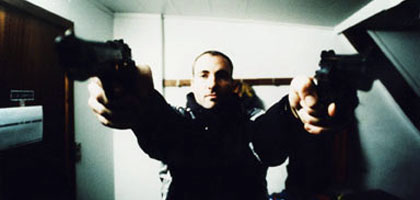
Natural Selection

Nicolas Winding Refn's Pusher trilogy establishes an extremely unromantic and brutal form of crime cinema - one that isn't really interested in crime at all but is fascinated by criminals' nihilistic approach to the everyday. By Jonathan Romney
Danish director Nicolas Winding Refn likes to leave his characters dangling. His debut feature Pusher (1996) ends with anti-hero Frank, a Copenhagen drugs dealer, staring into the night, his last option used up. All his connections have reneged on him and his girlfriend has stolen the money that could have saved his neck; meanwhile Serbian crime boss Milo, to whom Frank is terminally in debt, calmly watches his henchman laying out plastic sheets for a grisly ritual we can only imagine.
In Refn's new film Pusher 3 (aka I'm the Angel of Death) Milo, having himself endured one of the most hellish nights in recent cinema, returns to his suburban home to ponder his uncertain future. Milo's life and its questionable rewards are evoked in a closing shot of leaves blowing around his empty swimming pool. It's an incongruously contemplative image that packs all the more bitterly ironic a punch given the brutality of what has preceded it - a graphic demonstration of just what that plastic sheeting is for.
In 1996 Pusher exemplified everything you imagined a hyper-confident young post-Tarantino film-maker might achieve with limited resources and a handheld camera: a narratively bustling, quasi-vérité vignette of urban low-life, soundtracked to a relentless throb of techno and Scandinavian thrash metal. Now two further episodes have established the Pusher trilogy as one of the most distinctive exercises in recent crime cinema - although in fact, Refn insists, "The Pusher films are about people in a criminal environment, not about crime."
The original Pusher is about Frank (Kim Bodnia), king of his Copenhagen drug patch until he's busted in mid-deal, leading Milo to call in a debt which escalates alarmingly from scene to scene. What's chilling about Milo - played by Croatian actor Zlatko Buric with the hipster bonhomie of a rock promoter gone bad - is how charmingly he conducts his business. Happy to help his old pal Frank, he obligingly sends his heavy Radovan (Slavko Labovic) to assist him in recouping his money. But once Frank's every remaining hope has fallen through, he is the one Radovan is shaking his meaty head at, with a doleful look that says, "This will hurt me more than it'll hurt you."
Humiliated machismo
Pusher had a sequel of sorts: its male leads Bodnia, Buric and Mads Mikkelsen were reunited in Bleeder (1999), a dramatically slight moral drama about men's inability to communicate with women. It argued a little too strenuously that screen brutality is bad for you, then ran into a dead end, with its domestic-violence scenario spilling into mobster histrionics as if Refn were unable to break his genre addiction.
Refn stuck his neck out further with the English-language Fear X (2003), a nightmare narrative about a security man (John Turturro) puzzling over his wife's death. It was an impeccably classy production - music by Brian Eno, photography by Kubrick associate Larry J. Smith, script co-written by the late doyen of US low-life fiction Hubert Selby Jr - and if it finally ran headlong into a dark wall of inscrutability, that, Refn insists, was intentional: "The film melts down." At the very least Fear X over-reaches with panache, although a fraught production process left the director bankrupt.
Pusher II (2004) - English title: With Blood on My Hands - found Refn on more consistent form. The film is devoted to Pusher's mouthy, clueless skinhead Tonny (Mikkelsen), last seen beaten to a pulp by his friend Frank after snitching him to the police. Newly released from prison, Tonny celebrates by visiting two prostitutes, who snigger as this strutting would-be superstud fails to perform. It's the first of many disappointments. Tonny is desperate to win the respect of his father 'Duke' (Leif Sylvester), a stolen-car kingpin who has more or less disowned him; needless to say, he consistently screws up. In addition, an ex-girlfriend presents Tonny with a baby; it is implied that he is simply the dumbest, weakest candidate available for the father role.
Then Tonny is hapless enough to be present when the thuggish KusseKurt (Kurt the Cunt) farcically botches a deal with Milo. As Tonny heads for a desperate dead end, we wonder how this walking time-bomb of humiliated machismo will finally explode. But Refn wrongfoots us - and here's a spoiler warning if you haven't yet seen the film. The anticipated bloodbath doesn't happen: instead the film culminates in a concisely handled act of Oedipal revenge, followed by an ambivalent prospect of redemption. Tonny snatches his baby son and is last seen cradling him on a night bus. Has he found his gentle side at last, or is this simply a further step into the abyss? Refn has his own opinion: "Of course we know that after half an hour he's going to get arrested, because he probably tries to hold up a gas station with the baby." Still, we can't help feeling that Tonny is starting to grow up, even if it's too late.
The Pusher films illustrate a merciless underworld Darwinism: however hard you are, there's always someone harder waiting to take you for all you've got. In the first two films the alpha carnivore, for all his deceptive mildness, is Milo. In Pusher 3 - its dialogue, audaciously, almost entirely in Serbian and Albanian - it's Milo's turn to be squeezed. Foolishly landing himself in debt to the younger, more vicious new Albanian gang in town, he faces the humiliation of playing waiter while his café is used for a meeting as the hoods try to sell a young Eastern European woman for prostitution. All this happens on the same day as his daughter's twenty-fifth birthday party: he insists on doing the cooking himself, but a tainted batch of some delicacy leaves his henchman incapacitated with diarrhoea.
Then he makes the ruinous mistake of sampling some heroin, a malicious gift from Kurt the Cunt. His judgement blurred, Milo - by now blearily wading through his ordeals like a man knee-deep in tar - takes bloody revenge on his oppressors, then has to call in assistance to dispose of the bodies. His former muscle Radovan, now in the restaurant business, agrees to help out for old times' sake in a culminating sequence that's at once stomach-churning and icily comic. It's the mobster's moment of truth: this avuncular monster, who's used to having helpers do his dirty work, is obliged literally to get his hands bloody.
What's most horrifying about Milo's day is that the film treats all his actions - brokering deals, feeding his guests, mincing up bodies - as being on the same prosaic level of business to be taken care of. Milo can no longer tell the difference between these tasks: it's simply a hard night's work after which he goes back to his suburban house. The cruel end note is that - unlike the relatively plush New Jersey spreads we're used to seeing in The Sopranos - Milo's home, the fruit of his nefarious activities, is nice but not that nice. So that's what it's all for - a dry swimming pool?
Walking dead
The Pusher trilogy, especially parts 2 and 3, emphasises the bleak nature of a criminal existence that offers rewards which seem barely worth the effort. The high life depicted makes the heart sink: the venue for Pusher II's wedding party is a tacky club where strippers gyrate to deafening techno while the bride snorts herself into oblivion in the kitchen. For all its violence, Pusher 3 comes close to Mike Leigh territory in its comic depiction of the drabness behind the ostensibly glamorous surface.
Trainspotting -style dramatis personae sequences at the start of the films show the characters lit from below like skulls - they are already the walking dead. What makes them live, electrically so, is the force of the acting. Through the sheer scary energy of his nerves-edge performance, Mads Mikkelsen - now a major Danish name, though unknown when he first played Tonny in Pusher - turns the dim-witted thug of Pusher II into a character who finally achieves some sort of near-grace, meriting his own Hamlet-like moment of transcendence through revenge.
The other revelation is Zlatko Buric, whose Milo is one of those galvanising figures you delight in watching however loathsome you know him to be. Speaking a mangled Danish in slurred basso, Milo in the first Pusher appears all the more threatening for being so lazily jovial. His brief return in Pusher II, chuckling wryly over Tonny and Kurt's ineptitude, momentarily lightens the darkness - you're just glad to see him back. But there was no predicting the weight and complexity of Buric's Milo in Pusher 3: a winner on the skids, bulked out and gone to seed, yet just about holding his crumbling world together.
With his camelhair coat and archaic mullet cut, Milo is as much a dinosaur as the pianist-hoodlum hero's father in Jacques Audiard's The Beat That My Heart Skipped. Pusher II and 3 would make a great triple bill with Audiard's film, a 'bad dads' all-nighter illustrating the horrors of the criminal legacy: like Audiard's Thomas, Tonny can't shake off the moral virus he's inherited from Duke while Milo's daughter Milena (Marinela Dekic) is herself a rotten piece of work who's leaning on Dad for a slice of his business. Chances can't be too good either for Tonny's infant: one of the most horrifying things about Pusher II is the way we see children exposed to their parents' universe, like Duke's younger son.
Nicolas Winding Refn's international reputation has been strangely slow to catch fire, when Danish graduates of the Dogme academy, such as Lone Scherfig and the over-rated Thomas Vinterberg, have been taken so seriously. Perhaps it's because Refn is thought of as a genre director; perhaps it's because of his taste for wilfully trashy, splashy gestures, like the car-heist sequences in Pusher II, bracingly speedy cut-price Michael Mann. Some may find Refn's saga too moralising an application of the infernal rule of 'He who lives by the score, dies by the score.' But as a bravado evocation of a really rotten state of Denmark, the Pusher trilogy is an achievement that doesn't deserve to be ignored.
